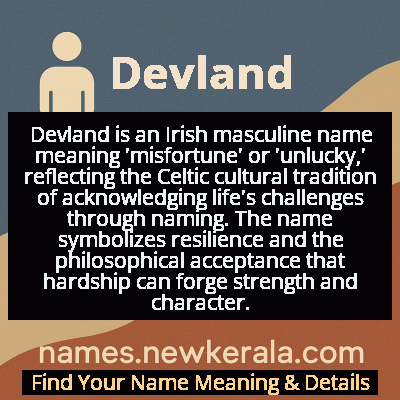Devland Name Meaning & Details
Origin, Popularity, Numerology Analysis & Name Meaning of Devland
Discover the origin, meaning, and cultural significance of the name DEVLAND. Delve into its historical roots and explore the lasting impact it has had on communities and traditions.
Name
Devland
Gender
Male
Origin
Irish
Lucky Number
8
Meaning of the Name - Devland
Devland is an Irish masculine name meaning 'misfortune' or 'unlucky,' reflecting the Celtic cultural tradition of acknowledging life's challenges through naming. The name symbolizes resilience and the philosophical acceptance that hardship can forge strength and character.
Devland - Complete Numerology Analysis
Your Numerology Number
Based on Pythagorean Numerology System
Ruling Planet
Saturn
Positive Nature
Ambitious, efficient, realistic, and authoritative.
Negative Traits
Materialistic, stressed, confrontational, and can be overly ambitious.
Lucky Colours
Dark blue, black.
Lucky Days
Saturday.
Lucky Stones
Blue sapphire, amethyst.
Harmony Numbers
2, 4, 6.
Best Suited Professions
Business leaders, managers, financial services, law enforcement.
What People Like About You
Leadership, determination, organizational skills.
Famous People Named Devland
Devland O'Connell
Irish revolutionary
Young Irelander Rebellion participant and independence advocate
Devland Fitzgerald
Poet and writer
Authored influential collection 'Shadows of the Emerald Isle'
Devland MacCarthy
Folk musician
Award-winning revivalist of traditional Irish music
Devland Byrne
Academic historian
Definitive scholar of Celtic studies and Irish mythology
Name Variations & International Equivalents
Click on blue names to explore their detailed meanings. Gray names with will be available soon.
Cultural & Historical Significance
The name also represents the Irish cultural value of 'making peace with one's fate' while maintaining dignity and strength. In many Irish families, names like Devland were chosen to honor ancestors who had endured significant hardships, serving as reminders of survival and resilience. The cultural significance extends to the Irish diaspora, where the name became a symbol of maintaining cultural identity through difficult transitions. In modern Irish consciousness, Devland represents the philosophical depth and emotional complexity that characterizes much of Irish literature and art, where beauty often emerges from acknowledging life's inherent struggles and contradictions.
Extended Personality Analysis
Individuals bearing the name Devland typically exhibit a complex blend of introspection, resilience, and emotional depth that sets them apart. Their personality is often marked by a philosophical outlook on life, developed through their innate understanding that challenges are inevitable and often transformative. Devlands tend to be highly observant and perceptive, with an ability to read situations and people with unusual accuracy. This makes them excellent problem-solvers and trusted advisors, though they may struggle with occasional melancholy or pessimism. Their emotional intelligence is typically well-developed, allowing them to form deep, meaningful connections with others who appreciate authenticity over superficiality.
In social settings, Devlands often present as reserved initially but reveal sharp wit and dark humor once comfortable. They tend to be fiercely loyal to those who earn their trust and demonstrate remarkable patience in relationships. Professionally, they excel in fields requiring deep analysis, creativity, or empathy - such as counseling, arts, academia, or social work. Their life journey usually involves learning to balance their natural caution with calculated risk-taking, ultimately developing into individuals who appreciate joy more deeply because they understand its temporary nature. The name's association with misfortune often manifests not as actual bad luck, but as a personality that finds strength and wisdom in life's inevitable difficulties, making them particularly valuable during crises when others might falter.
Modern Usage & Popularity
In contemporary naming practices, Devland maintains a distinctive presence as a choice that balances cultural heritage with unique character. The name experiences periodic revivals, particularly during cultural movements that value authentic Irish names over more common Anglicized versions. Modern usage reflects a shift in interpretation - where previous generations might have viewed the 'misfortune' meaning as overly negative, contemporary parents often see it as representing resilience, depth, and philosophical acceptance of life's complexities. The name appears most consistently in Ireland and among second or third-generation Irish families abroad, particularly in the United States, Canada, Australia, and the United Kingdom. While it never appears on popular name charts, it maintains a steady niche following among parents seeking meaningful, culturally grounded names that stand out without being overly eccentric. Recent years have seen a slight increase in usage as part of the broader trend toward unique names with historical significance, though it remains uncommon enough to maintain its distinctive quality.
Symbolic & Spiritual Meanings
Symbolically, Devland represents the profound concept that true strength and wisdom often emerge from navigating adversity rather than avoiding it. The name embodies the Celtic understanding of life as a tapestry woven from both light and shadow, where hardship serves as the contrast that makes joy more meaningful. It symbolizes the transformative power of struggle - the alchemical process through which suffering can be converted into resilience, empathy, and depth of character. In a metaphorical sense, Devland represents the soil from which personal growth springs, suggesting that the most fertile ground for development often comes from working through difficulties rather than enjoying uninterrupted ease. The name also carries symbolic weight as a reminder of cultural endurance, representing how Irish identity has been shaped and strengthened through historical challenges. Ultimately, Devland symbolizes the philosophical acceptance that a fully realized human experience must include both triumph and tribulation, and that our response to misfortune defines our character more than the circumstances themselves.

